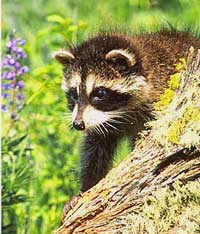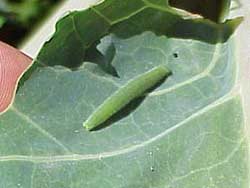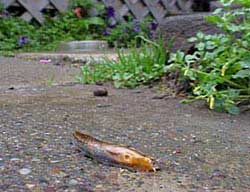No matter how good a gardener you are, at some point or another animals, insects, and diseases will attack your plants. Organic gardeners know this is a fact of nature and will tolerate some damage to their fruit trees, berry bushes, vegetables, and herbs. A perfect plant doesn't mean one that is completely blemish-free. However, if left unchecked a little damage can quickly turn into a lost crop.
There are a number of organic pest control techniques you can use to keep your plants safe and pests at bay. Start now, before disaster strikes in your garden. Here are my top 10 ways to protect and save plants from pest attacks. I know there are other controls and a bevy of home remedies out there, but I consider these some of the best. Tell me your favorite pest control methods and I'll publish a list in the next issue of Edible Landscaping.
1. Right varieties. The best way to prevent insect and disease attacks is to select the right variety of tree, shrub, or vegetable for your climate and the planting site. A disease-resistant apple tree, such as 'Liberty', will require much less spraying than susceptible varieties. A blight-resistant cucumber variety, such as 'County Fair', will make controlling this disease much easier.

Raccoons love to munch on sweet corn and dig around in the garden. The best way to control raccoon damage is to exclude them with a sturdy fence.
2. Floating row covers. Nothing stops insects like a physical barrier and one of the best for vegetable crops is the floating row cover. This lightweight, nonwoven fabric lets in light, air, and water but stop insects from feeding, and laying eggs. Row covers work great on greens, broccoli, root crops, and any crop that doesn't need pollination by bees. They will also protect seedlings from cold temperatures down to 28 degrees F or lower, depending on the thickness of the fabric.
3. Electric fence. Speaking of barriers, an electric fence is one of the only sure ways to keep Bambi, Rocky Raccoon and other animals from your prized edible patch. While repellent sprays may work for a while, animals are smart enough to get used to the spray and move in anyway. If deer pressure is low use a single strand of electric fence wire 30 inches off the ground. In regions with large populations of hungry deer, use multiple strands spaced a few feet apart. The key is to set up the fence early in the season before animals find your vegetable patch or fruit trees. You can "teach" the animals to avoid the fence by baiting it with peanut butter. After a few harmless shocks, they probably will avoid the area all together.

Cabbageworms attack many plants in the broccoli family, chewing on leaves and reducing yields. Spray Bt to control this pest.
4. Bacillus thuriengensis (Bt). This essential organic pesticide is a naturally occurring bacteria that attacks the larvae of butterflies and moths, including cabbageworms, tent caterpillars, corn earworms, hornworms, and cutworms. The beauty of this popular control is it only attacks caterpillars in the Lepidoptera family and doesn't harm other insects, bees, pets, and humans. The downside is that all butterfly and moth larvae are susceptible to this pesticide, so use it sparingly and avoid it on butterfly larva plants, such as parsley.
There are also strains of Bt that attack Colorado potato beetle larvae (Bt 'San Diego') and mosquito larvae (Bt israelensis).
5. Horticultural oil. Unlike its heavier and more toxic cousin dormant oil, horticultural oil is a lightweight, fine-grade petroleum- or vegetable-based oil that coats insect eggs, larvae, and adults and smoothers them without harming foliage. Use oil in the vegetable garden to kill aphids, leafhoppers, spider mites, and whiteflies. A few drops of oil in the tips of developing sweet corn ears controls corn earworm. Oils present few risks to both gardeners and desirable species and integrate well with natural biological controls and dissipate quickly through evaporation, leaving little residue. However, oils can damage plants if applied at excessive rates, on sensitive plants, or on particularly hot (above 100 degrees F) or cold (below 40 degrees F) days.
6. Insecticidal soap. This fatty acid-based product is one of the safest sprays to use in the garden. It primarily kills soft-bodied insects, such as aphids, mealybugs, and whiteflies, but I have to admit a perverse joy in watching handpicked Japanese beetle adults drown when dropped into a pail of soapy water. Commercially formulated insecticidal soaps are better than home remedies because they have been tested to be safe on a variety of plants. However, some plants, such as peas, can be burned by the spray.

Slugs are a big problem during cool, damp weather. They feed on the leaves and flowers of many plants, particularly hosta, lettuce, and greens. Iron phosphate-based baits are a safe and effective control.
7. Iron phosphate for slugs. Slugs and snails love cool, moist weather and dark hiding places and can make a dinner out of your leafy greens. The best methods of control include spacing plants generously so the soil dries quickly and removing mulch where these pests like to hide. Copper wire barriers will keep slugs out of containers and raised beds. One of my favorite products is iron phosphate-based pelleted bait, which I sprinkle in the garden. The pellets have a slug attractant mixed in. When the slugs and snails come to eat the bait the iron phosphate proves fatal, killing the slimy critters without harming other beneficial insects, animals, and humans.
8. Neem oil. This extract from the seeds of the tropical neem tree is nontoxic to pets and humans, but helps control some of our worst pests, such as Japanese beetles. Instead of killing the adults outright, it acts as a deterrent, stopping insects from eating and mating.

Japanese beetles are the scourge of many gardens. They love a wide variety of plants including grapes and raspberries. Handpicking and neem oil sprays can help reduce damage.
9. Spinosad. This soil-dwelling organism was discovered as a by-product of the rum processing industry in Jamaica. A fast-acting bacterium, it kills a range of chewing insects such as caterpillars, thrips, sawflies, leaf beetles, spider mites, and leaf miners. It's not as effective on sucking insects. It doesn't harm ladybugs and other beneficial insects.
10. Traps. Fruit trees are notorious for having insect pests attack the developing fruit. While there are tree varieties that resist diseases, to control insects you have two choices: spray or trap. There are two types of traps. One type, such as the apple maggot trap, controls the pest. The codling moth trap is an example of other type of trap and is used to monitor insect populations so you know when to spray. Some traps attract the insects by color and form, such as the yellow sticky cards used to trap whiteflies. Other traps attract the insect with a pheromone lure. Check out fruit tree supply stores for the best traps for the pests in your area.
Other Great Organic Pest Control Stories Charlie Nardozzi is an award winning, nationally recognized garden writer, speaker, radio, and television personality. He has worked for more than 30 years bringing expert gardening information to home gardeners through radio, television, talks, tours, on-line, and the printed page. Charlie delights in making gardening information simple, easy, fun and accessible to everyone. He's the author of 6 books, has three radio shows in New England and a TV show. He leads Garden Tours around the world and consults with organizations and companies about gardening programs. See more about him at Gardening With Charlie.
Charlie Nardozzi is an award winning, nationally recognized garden writer, speaker, radio, and television personality. He has worked for more than 30 years bringing expert gardening information to home gardeners through radio, television, talks, tours, on-line, and the printed page. Charlie delights in making gardening information simple, easy, fun and accessible to everyone. He's the author of 6 books, has three radio shows in New England and a TV show. He leads Garden Tours around the world and consults with organizations and companies about gardening programs. See more about him at Gardening With Charlie.
 Victory Seed Company has all the seeds you want for your best garden in 2024.
Victory Seed Company has all the seeds you want for your best garden in 2024.
For 25 years, the family-owned Victory Seed Company has provided the highest quality vegetable, herb and flower seeds to families across the country. We are passionate about providing you the best seeds available that give excellent germination, robust plants, and the harvest you want. With a catalog of over a thousand varieties, we have everything, and our prices are the kinds that we'd want to pay. We have hundreds of yesterday's heirloom vegetables, as well as today's award winning hybrid selections. Get to know us by visiting our website and browsing through our online vegetable seed catalog.